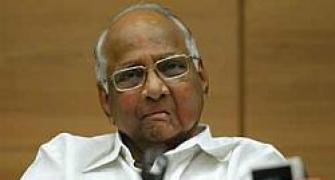 In a big boost to farm sector, Finance Minister P Chidambaram proposed a whopping Rs 1.25 lakh crore increase in agri-credit target for next fiscal at Rs 7 lakh crore and raised allocation to the ministry by a handsome 22 per cent.
In a big boost to farm sector, Finance Minister P Chidambaram proposed a whopping Rs 1.25 lakh crore increase in agri-credit target for next fiscal at Rs 7 lakh crore and raised allocation to the ministry by a handsome 22 per cent.
Presenting the Union Budget 2013-14, Chidambaram provided an additional Rs 10,000 crore in food subsidy for implementing the proposed National Food Security Act.
While allocating Rs 27,049 crore for Agriculture Ministry for 2013-14 fiscal, the Minister announced three new schemes with an outlay of over Rs 1,000 crore for crop diversification in states covered under green revolution, promotion of nutritious crops and giving thrust to livestock sector.
Asserting that agricultural credit is a driver of farm production, Chidambaram said: "We will exceed the target of Rs 5,75,000 crore fixed for 2012-13. For 2013-14, I propose to increase the target to Rs 7,00,000 crore".
The interest-subvention for short-term crop loan will be continued and farmers who repay loan on time will be able to get credit at 4 per cent interest per annum, he added.
However, he said, the scheme which so far is applicable to loans extended by public sector banks, Regional Rural Banks and cooperative banks, would now be extended to crop loans borrowed from private sector scheduled commercial banks.
On proposed National Food Security Law, Chidambaram hoped that the Bill would be passed by the Parliament soon and said:
"I have set apart Rs 10,000 crore, over and above the normal provision for food subsidy, towards the incremental cost that is likely under the Act".
Concerned over stagnant crop yields in states like Punjab and Haryana, he proposed Rs 500 crore to encourage farmers to switch to alternative crops from traditional rice and wheat.
"The original Green Revolution states faced the problem of stagnating yields and over exploitation of water resources. The answer lies in crop diversification. I propose to allocate Rs 500 crore to start a programme of crop diversification...," Chidambaram said.
To tackle malnutrition, Rs 200 crore has been allocated for a pilot programme to boost cultivation of micro-nutrients like iron-rich bajra, protein-rich maize and zinc-rich wheat.
Agriculture Ministry will formulate a scheme, he said, hoping that agri-businesses and farmers will come together to start a sufficient number of pilot programmes in the districts most affected by malnutrition. Launch of the National Livestock Mission in 2013-14 with an outlay of Rs 307 crore to attract investments and enhance productivity was announced.
Besides announcing new schemes, Chidambaram enhanced the allocation for the Rashtriya Krishi Vikas Yojana (RKVY) to Rs 9,954 crore for 2013-14 fiscal from Rs 8,400 crore for the current year. Similarly, the outlay for National Food Security Mission (NFSM) has been enhanced to Rs 2,250 crore from Rs 1,763.57 crore in the current year.
For Integrated Watershed Programme (IWP), the allocation has been increased from Rs 3050 crore in 2012-13 to Rs 5,387 crore for next year. The outlay for 'Bringing Green Revolution to Eastern States' has been retained at Rs 1,000 crore.
To improve market linkages for farmers, he announced support to set up Farmers Producers Organisation (FPO) by providing Rs 50 crore matching equity grants for registration process. A credit guarantee fund will be created in a small farmers agri-business corporation with Rs 100 crore corpus.
Pursuant to the announcement made last year, Chidambaram said a sum of Rs 5,000 crore will be made available to NABARD to finance construction of warehouses, godowns, silos and cold storage units designed to store agricultural produce, both in the public and the private sectors.
Renowned farm scientist M S Swaminathan hailed the Budget 2013-14 for giving a holistic approach to boost agriculture sector but it failed to focus on farm mechanisation to address the impending labour shortage resulted due to MGNREGA.
Reacting to the budget allocation made for the 2013-14 fiscal, Swaminathan said: "Obviously, every aspect of farming and every problem of the farmer cannot be dealt with in the Union Budget particularly since agriculture is a state subject, I only wish that Chidambaram had also included in his allocation a programme for farm mechanisation."
There is already a scheme with the Agriculture Ministry in this field, but it needs to be strengthened as labour shortages has intensified due to the Mahatma Gandhi National Rural Employment Guarantee Act (MGNREGA), he told PTI.
Gender sensitive farm equipments are required since the role of women farmers in agriculture is increasing, he added. Swaminathan said Finance Minister has adopted three pronged approach to ensure food and nutritional security.
The three new schemes announced aim to "defend the gains" already achieved in states covered under first Green Revolution, "extend the gains" in eastern India and "make new gains" by promoting nutritious-rich crops, he said.
Swaminathan, who his also a Rajya Sabha member, hoped the scheme announced for crop diversification would be fully used by state governments in Punjab and Haryana to introduce ecologically desirable rotations like cereal-legume rotation.
However, the National Collateral Management Services (NCMSL) Managing Director and CEO Sanjay Kaul expressed disappointment over the Budget for not giving adequate push to warehousing and cold chain infrastructure development through an integrated package.
Agri-biotech major Monsanto India, Region Lead Gyanendra Shukla said the Budget was "balanced" and kept focus on giving fillip to biotechnology and agri-research.
Seed firm Krishidhan Managing Director Sushil Karwa said the thrust on technology in crop diversification would help the biotech firm to focus more on research, while biotechnology association ABL-AG shared same thoughts.
With respect to vegetable oil industry, the Solvent Extractors' Association (SEA) said it is "unfortunate" that the Finance Minister has not proposed any new measures to reduce our dependence on burgeoning imports of edible oils.
"Allocation of Rs 500 crore for crop diversification is not enough for state like Punjab leave aside other agrarian states. This amount is too little and inadequate which will not help Punjab government to implement its crop diversification plan across the state," noted farm economist R S Ghuman said.
"It is very important to initiate crop diversification in the state because of falling underground water table and declining soil health," he said.
Punjab government has already sought funds to the tune of Rs 5,000 crore for crop diversification from Union government in order to bring down area under water-guzzling crop like rice and shift the fields towards other crops like cotton, maize, sugarcane, fodder, agro forestry, pulses, fruits and vegetables.
Under crop diversification plan, Punjab government had decided to reduce area under paddy from 28 lakh hectares to 16 lakh hectares in six years.
State-owned farm advisory body Punjab State Farmers' Commission Chairman G S Kalkat hailed the funds for crop diversification but said: "Funds should be allocated every year for crop diversification by the Centre as diversification is not possible in a one year. Centre should earmark funds on annual basis.
However, agriculture experts hailed the move of Centre earmarking Rs 3,415 crore for farm research for 2013-14. "The funds allocation for research will essentially promote innovation in agriculture to develop new high yielding and disease resistant varieties," said Ghuman.









